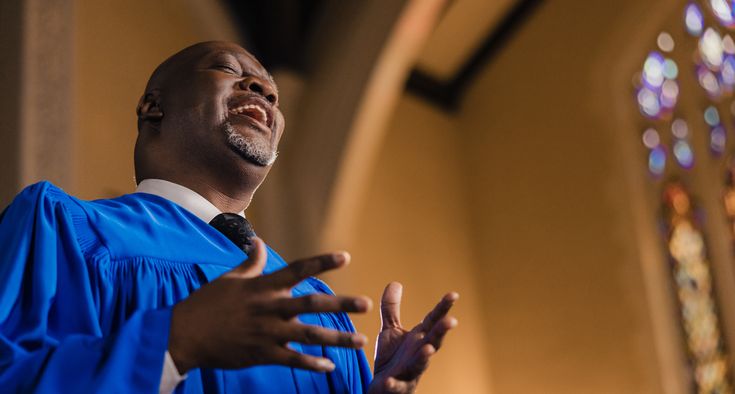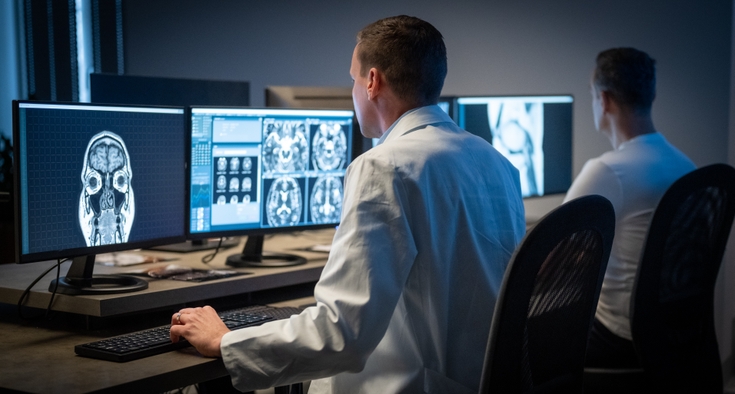Most patients who seek treatment at Novant Health Presbyterian Medical Center and the Novant Health Cancer Institute - Elizabeth don’t have to travel as far as Keith Ashe did.
An ambulance brought Ashe, 65, to Presbyterian from his home in western North Carolina. It was nearly a four-hour trip from Cullowhee, but that’s what his best friend of 20-plus years – and primary care physician – Dr. Matthew Mahar, recommended.
“We knew he needed more definitive care,” Mahar said. “The decision was between Emory Hospital, where Keith’s wife, Doris, had a liver transplant five years ago, or Novant Health in Charlotte. I know some of Novant Health’s doctors, and they know me. We trust each other. I thought it was the best option for Keith.”
Find the cancer care specialist you deserve
Ashe, a general contractor, had just returned home from an April hunting trip to his 600-acre farm in Kentucky with his pastor when he called Mahar about his worrisome symptoms. He’d been drinking a gallon or two of water daily – but, somehow, was still thirsty. He had also begun to feel fatigued and disoriented, was having leg and arm twitches and an uncontrollable case of hiccups.
Mahar was concerned about his friend’s “constellation of symptoms” and encouraged him to go to the ER in nearby Sylva. “When they called me from the ER that evening, they said Keith had a mass on his lungs,” Mahar said. It was probably cancer.
The news was overwhelming, Mahar continued, “but at the same time, Keith was a calming factor. He’s extremely positive and has a special relationship with the Lord. He’s helped make everyone feel at peace.”
Mahar was adamant that his friend and patient get to a place that offered top-notch, specialty care. “Keith needed to be in the ICU to have his sodium monitored,” he said. “I discussed it with the doctors in Sylva, and we all determined it would not be in the family’s best interests to try to do that in a small, rural community hospital.”
His family includes his wife, adult daughter, Samantha, and three grandsons. Naturally, he would’ve preferred to get care closer to home, but he trusts his friend of 20-plus years. So, he was readied for the journey to Novant Health in Charlotte.
“I had a comfort knowing these doctors are as good as it gets,” Ashe said.
Diagnosis and treatment
Once he got to Charlotte, the first priority was getting Ashe’s sodium stabilized. Low sodium levels – his was 108, and a normal reading would be 135 to 145 – were the reason for his insatiable thirst and confusion.
Doctors determined that Keith had Syndrome of Inappropriate Anti-Diuretic Hormone secretion (SIADH), which can be a sign of small-cell lung cancer. SIADH makes your body produce too much of a hormone that forces the kidneys to hold on to water, which triggers a low sodium concentration in the blood. Since the kidneys were involved, a nephrologist was added to Ashe’s care team.

When Ashe initially got to the ICU, a pulmonologist performed a bronchoscopy, allowing him to look directly into Ashe’s airways and get a tissue sample.
Ashe’s diagnosis: small-cell lung cancer, limited stage. The aggressive cancer has a tendency to spread to other areas of the body – including the brain – so Dr. Catherine Moore, a medical oncologist who treated him, ordered an MRI. Fortunately, Ashe’s cancer was contained.

“Small-cell lung cancer isn’t usually staged from 1 through 4 like other cancers,” said Dr. Kimberly Strickland, another medical oncologist who treated Ashe. “The staging is considered ‘limited’ versus ‘extensive.’ With limited stage, we can offer curative therapy to try and make the cancer go away. With extensive stage, we offer palliative therapy.”
Ashe’s tumor was classified as inoperable, meaning it would be difficult, or impossible, for a surgeon to fully excise. “Inoperable” does not mean “untreatable,” however. And so together with Ashe, Moore and the care team began to work on a treatment plan.

“With limited stage, we can try to treat with a curative intent,” Moore said. “This is an incredibly aggressive cancer, and limited stage is generally treated with multimodality therapy, meaning chemotherapy plus radiation. I reviewed Mr. Ashe’s images with Dr. Scott McGinnis of Southeast Radiation Oncology, who felt he was a good candidate for radiation.”
Two chemotherapy agents – Cisplatin and Etoposide – are used to treat small-cell lung cancer, Moore explained. With radiation on the horizon, Ashe received his first round of curative therapy as an inpatient at Novant Health Presbyterian.
Mutual admiration
Ashe clicked with his Novant Health care team immediately. The feeling was mutual.

“I can't say enough about the staff here,” Ashe said. Tay-Lea Clayton, a medical oncology physician assistant, “really stuck out in my mind, partly because she’s the same age as my daughter. She – and everyone, really – took time to explain things to me clearly. Instead of saying, ‘You’ve got some-big-ole-word, they talked to me in ways I can understand. And because I understood what they said, it made me feel like I was still in control.”
As Ashe packed his bags to return to Cullowhee on May 2, Clayton was sad to see him go. “He was definitely someone I enjoyed taking care of,” she said. “He told me all about his family, his job and his love of the outdoors. I love getting to know patients and learning what's important to them. We don’t want to just treat their cancer, because they are so much more than their cancer.
“I told him that if I ever see him again – and I hope I do – that I hope it’s not in the hospital.”
Dedicated cancer care from empathetic specialists
Keith Ashe’s care team in Charlotte understood why his primary care physician back home wanted his treatment to start at Novant Health.
“Our cancer institute has thoracic oncologists, thoracic surgeons, radiation oncologists, interventional radiologists, pulmonologists and other specialists who can do procedures you might not find in a rural area,” Dr. Kimberly Strickland said. “Our clinical trial opportunities are another reason cancer patients choose us.”
What’s more, patients don’t sacrifice personal attention when they get care at Novant Health Cancer Institute. Indeed, the personal attention was one of the things Ashe appreciated most.
His team would’ve loved to continue treating him – but also understood why he wanted to go home.
Novant Health doctors have been in touch with Ashe’s doctors back home. “And they’ve even called and checked on me since I’ve been back,” Ashe said. He finished a three-week course of radiation and is now about halfway through four rounds of chemo.
He’s adjusting to the dietary restrictions his team has recommended and dealing with fatigue – a common side effect of chemo. Neither is easy for him. “I've not been one to sit around much,” he said. “That’s the hardest part for me. I’m used to getting up at 4:30 in the morning to do my devotionals, and I’m usually out the door by 6:30.”
He’s maintaining his positive outlook, Mahar reports – even though he’s having trouble swallowing. (That’s a common side effect of radiation.) At least he’s on familiar turf and surrounded by family and friends.
“Keith came back to the mountains to be close to his family,” Mahar said. “I think most people with a diagnosis like his would want to be close to family, church, to the people who know and love them.”
Expect good things
Being a small-town doctor is fulfilling work – and it’s all Mahar ever wanted to do since his boyhood in a small Nebraska town – but it’s frustrating when a patient needs specialty care.
“I want to be able to refer my patients in this community – who are also my friends – to the best care possible,” Mahar said. “Novant Health starting a cancer hospital in this region would give us the specialty care we need.” (See more on this below.)
Ashe hopes something good will come from his experience. In fact, he fully expects it to. He’s advocating for a cancer hospital close by, so others can get the care he had to travel to get.
“For my whole life, it seems like when I go through something bad,” he said, “something good comes out of it. When I go through a hard time, the good Lord gives me something better. I’m going to be watching to see what good comes out of this.”

Novant Health’s cancer care plans for Asheville and beyond
Novant Health has applied to build a 26-bed cancer-focused hospital in North Carolina’s Buncombe County. The proposed hospital, Novant Health Asheville Medical Center, is slated to be built on a 24-acre site owned by Novant Health at 455 Long Shoals Road.
"We listened to what the region wanted most and we are excited about this new opportunity to deliver the compassionate care and lifesaving innovation the community deserves,” said Dr. John Mann, president of specialty institutes, Novant Health. “We’ve already taken steps to preserve cancer care access in partnership with respected local surgeons, and we look forward to building on that momentum.”
The new hospital will build on the relationship Novant Health is already developing with the medical community and residents of Western North Carolina. Novant Health Surgical Partners - Biltmore opened in November 2023, bringing more specialty services, including surgical oncology, to the region. The team has been building relationships with Asheville-area physicians and other clinicians who know the community best.
The proposed hospital will pair the expertise of trusted local physicians with resources from the world-class Novant Health Cancer Institute, which has the ability to treat more than 100 different types of cancer.
In addition to the proposed hospital, Novant Health committed $20 million over the next five years to further develop rural care in the region. The hospital system acquired space at 1815 Hendersonville Road in Asheville for a multispecialty medical office building. The system has also expanded urgent care services with three Novant Health GoHealth urgent care centers in Asheville and nearby Black Mountain.











